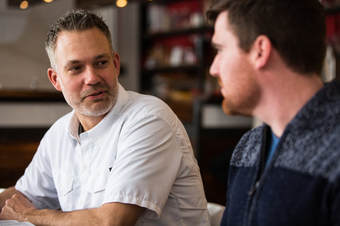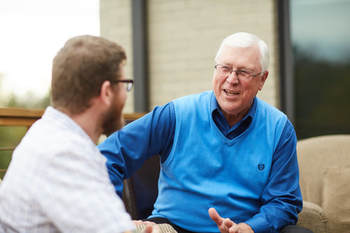 The following is a guest post by Bill Mann, who writes and speaks on inter-generational mentoring. When people approach me about mentoring, I usually tell them that one of the key ingredients to being a successful mentor is to put your pride in your back pocket and take a large dose of humility. Just like a vitamin, humility goes a long way to forge a relationship with the next generation. Every relationship has at least four levels of communication. These levels are separate and usually are done sequentially. The levels are:
Why is this important? Well, one of the highest values of the next generation is that they crave authenticity. They want to interact with people who are real with them and willing to share their lives – both the good and the bad. That, of course, requires mentors to develop an ability to be transparent. Regi Campbell writes a weekly blog for Radical Mentoring. In a recent blog, he observed that the intensity of young people increases when your stories are about failure you have experienced. They don’t take well to what he calls “victory laps” which often looks like self-promotion than being authentic. I agree. Regi ascribes the power of “failure stories” to the following (I have added one at the end):
The challenge is straightforward. Mentors need to be willing to express humility and vulnerability to their mentees. They want to know that you messed up, and that you learned from your mistakes. They will make their own mistakes, but possibly not the same ones you did. In addition, you will develop an ability to communicate at a deeper level.
0 Comments
 As a sophomore in college, I served as a student leader. Our team was responsible for providing peer mentoring, planning student programs, and helping with various campus activities. We were volunteers, with leadership responsibilities piled on top of classes, homework, and part-time jobs. It was important for us to stay focused on the goal. One of our team leaders often encouraged us by saying, “It’s all about the one!” It didn’t matter if attendance at an event was low, if one lonely student came and found community and new friends, it was worth it. If we had a test looming the next day, but a student struggling with depression showed up at our door, giving up some sleep and taking time to encourage her was meaningful. That slogan helped keep us focused on how critical investing in just one person can be! Our culture is obsessed with numbers as indicators of success. We measure success as the amount in the budget; the number of customers, guests, sales or conversions; or the size of our facilities. While there are great reasons for this, it can also be a distraction. I am often asked how to create a successful leadership development or ministry program for youth and young adults. Mass methods are only marginally effective. The best way to engage with and develop a young person is one-on-one, or in small teams and communities. Millennials and Generation Z have access to information unlike any other generation in the history of the world. They don’t need another great program; they need to process. Indeed, the number one predictor of a young person retaining their faith is a meaningful relationship with an older believer. Trusted mentors and friends and safe spaces in the frenzied worlds of youth today can provide opportunities for the development of strong values and convictions. I call this period that we are in the “season of a remnant.” Regardless of your setting, it is unlikely that we will accomplish significant change or impact in young lives and perspectives through large group trainings, conferences, or classes. Relationships, community and meaningful conversation are where the most formative experiences occur. Wondering why a young people has a specific political view? Engage them in a conversation (not a lecture!) about it. Wanting to instill an essential character trait or leadership quality in a young mentee? Model it for them, inviting them to share in a meaningful leadership experience. Hoping to share faith or truth with a generation that desperately needs it? Begin with “the one” or a few…a remnant. Will and Ariel Durant, Pulitzer-prize winning historians, in discussing the inevitable decline of civilizations, write the following: “Nations die. Old regions grow arid, or suffer other change. Resilient man picks up his tools and his arts, and moves on, taking his memories with him.” I often reflect on this statement and think about my students and my children, their children and grandchildren. As the civilization we belong to undergoes change, what tools and memories do we want young people to possess as they move on to a new or changed civilization? What tools do we want to ensure they carry with them into an uncertain future? There will always be a resilient remnant and equipping them means we sometimes have to remain focused on “the one!” |
AuthorDr. Jolene Erlacher is a wife, mommy, author, speaker, college instructor and coffee drinker who is passionate about empowering the next generation of leaders for effective service! Archives
May 2024
Categories
All
|

 RSS Feed
RSS Feed